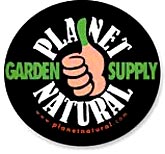source: Jepson Prairie Organics
Callooh callay, oh frabjous day! San Francisco has just become the first American municipality to institute city-wide compulsory collection of food scraps, which get composted. Nationwide, the EPA reports that food scraps make up an appalling 13% of the refuse currently sent to landfills. Once there, they decay anaerobically (without oxygen), a process that produces methane, a greenhouse gas which is twenty times more potent than carbon dioxide.*
One of the best things about SF's policy, it seems to me, is that the city has done all it can to make it easy. It delivers its "green carts," available in three sizes, to residents, and the service costs them nothing, though businesses do have to pay.
Furthermore, when these folks say "food scraps," they mean it. Meat ("including bones,") and fish ("including shellfish") can be tossed into the carts. No messing about trying to separate the leftover meats from the vegetables; just scrape the scraps into the bin. Food-soiled paper and cardboards — ice-cream cartons, pizza boxes, paper plates and so on — can also be tossed in the green carts. (The SF web-site lists all allowed and dis-allowed items.)
All that stuff banned from your back-yard compost pile can go into a large-scale composting system because its sheer size guarantees that it will reach the high temperatures (over 130F, or 54.4C) necessary to kill pathogens. (Guarantees, that is, as long as it's efficiently managed.)
The compost is being sold to local farmers, including vineyards, which prefer it to other, yardwaste-only products, because compost made with food scraps does a better job of improving soil structure. Do those sales cover the cost of the program? Apparently the private company that runs it thinks so.
Ironically, even San Francisco — with the best program in the States — lags way behind many cities in Asia, where food waste is often fed to livestock, and in Europe, where composting has been in place for years, or even in North America. Toronto's composting policy encompasses numerous items that terrify Americans, even those in San Francisco: baby diapers, sanitary products, pet bedding, kitty litter, and dog feces, to name a few.
I wonder when we'll catch up? Before the ice-caps melt, drowning most coastal cities, driving their inhabitants inland, and making organized efforts impossible, I hope.
__________________________________________
*Lots more details, including all the sources for these claims, is available in the Talking Trash section of mycomposting article.

 Subscribe to RSS feed
Subscribe to RSS feed



Wow, Kate, that’s impressive! (Though admittedly I’d rather see those kitchen scraps going into home gardeners’ compost piles.) And your comments about the other countries are right on. We should be leading, not frantically scrabbling along behind!
Thanks, OFB. An NPR story on the SF program was the source for some of the comparative info; I’ve been keeping an eye on Toronto’s program for a while. SF’s list of allowed items looked impressive until I compared it to Toronto’s.
I think that Toronto composts its own waste, which it makes available to residents for free; its site says that the compost “will be used as a soil amendment for farmland and parkland,” which is a bit vague. SF’s waste is collected and composted by a private company which sells the product. Maybe that helps explain the difference in what each accepts? I’m not sure.
–Kate
yeah! in my fair city, i got a warning for tossing some of those expensive compostable paper plates in the yard waste bin…
That sounds like a great project. Hopefully it will spread, especially if it can pay for itself.
And I saw your page in Fine Gardening last month (or was it the month ago?). How fun! Congrats.
Wow, Town Mouse. That would be Santa Cruz? Sounds like they take their composting seriously!
VW–A great project indeed. Despite the fact that it’s not on the cutting edge, considered in a world-wide context, it’s still a breakthrough here in the States. (Have you got similar programs in GB?)
The FG article was this month, There was a mixup about deadlines, which I therefore missed, so the version I really liked got left on the cutting room floor. Sigh. A learning experience, I guess.
–Kate
A friend of a friend who lives in S.F. –
she who shall remain nameless -was bemoaning the composting law. Said she simply would not do it! They could come and inspect her garbage and fine her! A bin for food scraps in her condo kitchen…you must be kidding!
Well, kate, my friend, there you have it.
There are those of us who love , love, love!! compost, and then ya got them others :~D
There where turmoil in Norway too, when we were asked to separate plastic in addition to paper and food scrap. We now have 4 bins each and most people find it hard to accept. The reason they do is that the waste bin is emptied only every second week and you have to pay extra if you need a bigger bin. The other bins (paper, food scrap, plastic) are for free and you can deliver as much as you need. Luckily I have hens, and they take care of all food scrap from our house.
I’m afraid my sympathy is limited for such as these, Alice. Though I did see one blog that attacked this law as an assault on personal freedom. Give me a break!
Greetings, Mari Anne! And I thought everyone in Norway willingly adhered to the recycling laws. Well, I suppose that was rather naive of me. Anyway, it does seem sensible to have a bit of incentive behind the law, such as the one you describe: if you put everything in the garbage, you have to pay more for it.
I admired your chickens over on your blog (I love its name–“Out of the Blue”). It just became legal to keep chickens here in Bozeman, but our yard is just so small, it probably doesn’t make sense. I’d sure love to have fresh eggs, though.
–Kate
Wow, I wish my state had a program like that, over here I have to scavange for composting supplies, and have to worry if it’s a little unsightly for the neighbors.
Welcome, Skittle guy,, and apologies for the delay in replying!
I wish I knew where you’re located. Scavenging is good (I do more and more of it), but I do feel fortunate that I don’t live in a neighborhood so pristine that I’d have to worry that composting might offend someone. Good luck!
–Kate
Out of the blue, but referencing a conversation from a couple of years ago: do industrialized agricultural methods help or hurt the environment? Well, interesting research surprises the intuition. Articles with links to research can be found here in regards to beef cattle production:
http://www.beeftechnologies.com/eco/
Its a great ideal for the environment. Keep up the good work.